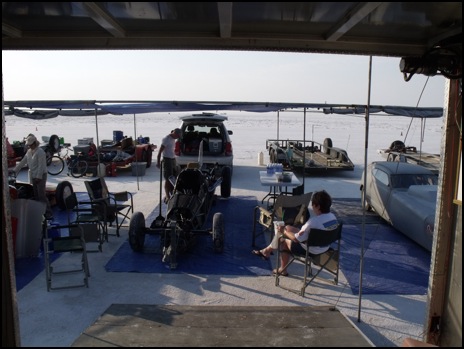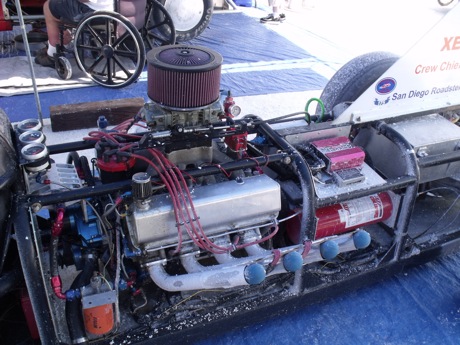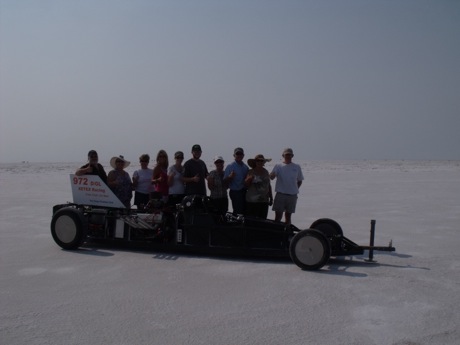2012
Martha and I loaded up the Lakester and hauled it up to
Bonneville. Arrived Friday morning, set up the pit area and
unloaded the car from the trailer:

We took the car to Tech Inspection that afternoon. Having
taken the car out to San Diego for a pre-inspection, and
then to El Mirage for a 'real' inspection, this one was a
snap. Everything was as it was last month and the
inspectors were happy.
That afternoon, just as we were getting ready for Martha to
start 'belt school' (because this car has a 9-point harness
system that isn't quite obvious to assemble on me AND
because I had never put it on myself, having always been
the one that was belted in), two friends from the Northwest
showed up and asked if they could do anything to help!
Martha was ecstatic. "Yes!" she cried. And so, Paul Warner
and Todd Sizemore found themselves drafted as pit crew for
972 D/GL. Thanks guys! See you next year???
Saturday morning, after the driver's meeting, we pulled the
car into line on the combo course (short and long courses)
to see if the car could qualify for the long course. At
Bonneville, you have to prove your car is fast enough to
not waste time running down the 5 mile course. The
qualification is to exceed 175 mph from the 2 to the 2-1/4
mile mark on the short course. The Mustang did this in 2006
on a test run. Surely the lakester would have no problem,
yes?
The first run was ignominious. The car wasn't actually in
gear -- even though the shifter made a substantial 'clunk'
when we moved it. I got a short push off and then ...
nothing. Barely made it off the course. We went back to the
pits and discovered that my new shifter plate, that I'd
made after El Mirage in hopes of making my shift scheme
work, didn't let the shift arm move far enough forward or
backwards to actually get the car in gear. So out came the
die grinder and files.
Sunday, we pulled the car to the short course. Todd pushed
me off a bit faster this time. We had decided that the 1-2
shift was not reliable so I started in second gear. Took
off and ... only did 145 in the quarter. I shifted before
the shift light came on (I don't know why). And the engine
just wouldn't pull in third at all. In fact, it felt
stronger at part throttle. When I got out at the end of the
run, the reason was pretty obvious -- the air scoop that I
hoped would add a little power to the engine had turned
sideways! No wonder the engine felt like it couldn't catch
it's breath. On the way back to the pits, I bought a round
air cleaner.
We got back in line to try again. Todd pushed me off again
and I probably left before I should have and, again, didn't
run the engine up to red-line in second gear. Did 172.887
in the quarter this time, though. Almost there.
Back in the pits, we talked with Eric Eyres about our
problem. He suggested we try some smaller wheels/tires he
had in his trailer to effect a shorter gear ratio. Sounded
great. Monday morning, I tried swapping wheels but they
were 15" rims (vice my 18" rims) and wouldn't clear the
brake calipers. Then Joel Cloud offered us any of his QC
gear sets if we could find something that would work
better. Didn't find a suitable set so, after more
discussion, we decided to push like crazy with the Durango
all the way to the 1/4 mile marker and see what we could
do.
Out on the short course that morning, I finally qualified
with a 176.500 mph run in the quarter (and 184.643 in the
third mile). Went to registration with the timing tag and
got the 175 mph banner to stick on the car, indicating a
legitimate long-course vehicle. Of course, this run
couldn't be completely drama-free. Just ahead of me, Mark
Lintner in the 827 roadster got loose at the 1 mile and
gave everyone on the starting line a good look at the
numbers on the right side of the car! I also got loose
about the same place but a little lift on the throttle got
me straight again and then it was back to full throttle for
the rest of the run.

Monday afternoon, we got into line on the long course to
see what she would do. Todd pushed me off to the quarter
mile mark and I took off in second gear. Waited for the
shift light to pull third gear, and ended up going 202.610
mph in the fifth mile. Not bad. Faster than the Mustang by
a hair and this in a brand new car. My quarter speed was
180.628, better than the previous run but still not all
that fast. Russ Eyers suggested we push even harder and try
to get the quarter speed up to maybe 182 or so.
I had to admit, I had been getting worried because Jim
Best's family was flying up to Salt Lake City Monday
evening to come out on Tuesday for a memorial run for Jim.
And I had promised him a ride at 200 mph some years back
and hadn't quite made it (see 2010). Until I finally got
the car qualified for the long course, I was uncertain I'd
be able to keep my promise.
The family showed up Tuesday morning. Big eyes and necks
a'swiveling because none of them had ever been here before.
After some discussion about where they wanted to watch
from, we pulled the car into line on the long course. Jim
was comfortably ensconced in my parachute bag. Todd pushed
me off like it wasn't his car. I took off at the 1/4 mile
with my foot flat on the floor. Let the shift light go for
a bit, because I really didn't think I was going as fast as
I had yesterday. Shifted up and pulled through mile 5.
Popped the chute and said a quiet godspeed, Jim ... and it
was over.
The family had watched from the 5 mile to see the parachute
blossom so it didn't take them long to drive down to where
the car ended up. Honking and yelling at me, I finally
figured out that I had gone even faster this run -- 205.136
in the last mile with a 206.086 exit speed. Yes! Best of
all, the chief timer announced that this was a memorial run
for Jim Best and gave all the speeds as I went down the
course. That was a nice touch and much appreciated by the
family. Oh, and I did 185.423 in the quarter. Thanks, Todd.

That was about it for this Speed Week. Todd and Paul had to
leave for home Wednesday morning. Martha still hadn't
learned the belt system. And I felt that I'd learned
everything there was to learn for this year. So we spent a
couple of relaxing days being spectators and visiting
friends on the salt. Linda and Tracy spent most of Tuesday
afternoon and Wednesday morning at the starting line for
the long course, meeting racers left and right. We might
have created a monster here.
Back at home, I played with my Drag Race Analyzer program
and figured out that the effective drag coefficient for the
essentially naked chassis was about 0.95, pretty close to
that of a flat plate. Clearly, some bodywork and
aerodynamics will reduce this number substantially and
raise the speed accordingly. Next year ...



